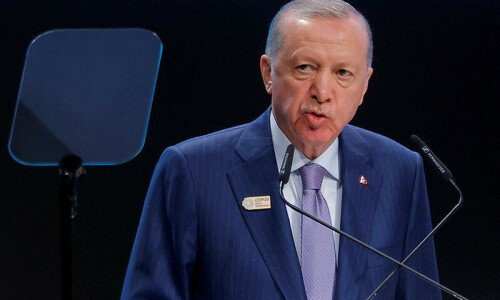Growing up is hard. There are important lessons to be learnt if you are going to realise your potential as a human being and a member of the society. Some of these lessons are easy to absorb, others can only be learned the hard way. There are often times during our young days when we feel unhappy about events at school, but with the passage of years we come to understand that even the most trying experiences were good for us.
Some of our most fond memories come from meaningful interactions with particular teachers. An accomplished and imposing gentleman named Ashfaq Hussain taught us English Language and Literature and was everyone's favourite. He had a regal walk, wore wayfarer sunglasses of seasoned vintage, and could outthink even the cleverest and naughtiest of boys at all times. A hardened veteran, he had come to Habib Public School after decades of experience, teaching at leading schools around the country. Mastery in argument was Ashfaq Hussain's almost superhuman strength. Many of us tried to get the better of him, but his logic and wit were unassailable. We hung on to every word that he uttered. Depending on his mood, he would pick some theme and wax eloquent, going off on tangents as we made our way through Shakespeare or Dickens. Many of the insights and pieces of wisdom he imparted to us are still with us today.
There were other teachers who left their mark. What distinguished them was their insistence on hard work and quality of effort, while at the same time empathising with the struggles of student life. I left Habib in 1980, but even today whenever my old school friends and I get together, one of these teachers' names is bound to come up.
Another lasting influence from school was the culture of discipline. There were clear limits, and invariable punishment resulted if the limits were crossed. Sometimes the rules seemed rather unnecessary and pointless. I remember after games, we had to come back to our classrooms and change out of sports shoes back into the brown leather shoes we had worn all day. Not doing so carried a penalty, usually getting pulled out of the homebound line and either being made to kneel down or getting a smack across the head. I never understood it at the time and it used to frustrate me quite a bit, but as one comes into practical life one appreciates the value of doing things a certain way, with regulation and decorum.
Although a physician by profession, I also devote my energies to cricket writing. It is ironic that I should have been so intensely bitten by the cricket bug at Habib, a school where playing cricket was taboo. Some time around age 13 or 14, I became part of a small group of friends who were thoroughly cricket-mad. We enjoyed playing cricket, but most of all we enjoyed reading and talking about it. We came up with abstruse cricket conundrums and debated them endlessly. Players' strengths and weaknesses were dissected as if our lives depended on it.
We learned of the reason behind Habib's restriction on cricket very late, and by that time we had just come to accept it as one of the quirks of the school. Sadly, some time in the 1960s, a student had died playing cricket in the school premises. A cricket ball had struck him on the chest and his heart stopped beating. It was a rare accident but it had shaped the school's attitude towards cricket.
Habib's real sporting emphasis was, of course, on hockey, and it was always held up as the glamour sport. The school had sent Safdar Abbas to the national team, and in subsequent years it would send Sohail Abbas too. Those of us keen on cricket had to use a hockey stick as a bat and we bowled with either a tennis ball or a white hockey ball. Any convenient open space served as a makeshift pitch. A set of broad concrete steps descending from the swimming pool towards the large asphalt hockey ground were a particular favourite.
At one point it was finally announced — I think it was 1976 or thereabouts — that there would be a school cricket team. Shoaib Mohammad, who became a Test cricketer, and Dara Bashir, who played first-class cricket and represented Pakistan at the Under-19 level, were probably the two most popular players. It was an excellent team and won several Inter-School championships. I understand, in recent years the restriction on playing cricket has been relaxed and there are nets and a concrete pitch, and proper cricket equipment is permitted.
Without doubt, the intensity and rigor of school life makes a crucial difference to our lives. It's a special pleasure when you come across others who share your schooling background and can reflect on it with similar emotions. There is an immediate sense of shared values and outlook, and in some ways you are back at school, if only for a fleeting moment.











































Dear visitor, the comments section is undergoing an overhaul and will return soon.